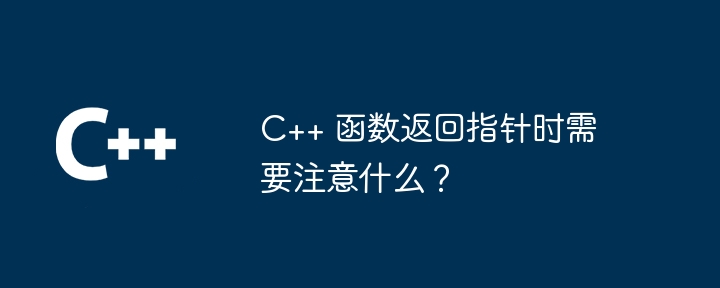Home >Backend Development >C++ >What should you pay attention to when a C++ function returns a pointer?
What should you pay attention to when a C++ function returns a pointer?
- PHPzOriginal
- 2024-04-20 10:24:021064browse
In C, when a function returns a pointer, you need to pay attention to the following: the pointer must point to a valid object, otherwise undefined behavior will result. After a function returns a pointer, do not modify the object pointed to by the pointer, otherwise other code will be affected. The caller is responsible for managing the memory and releasing it when it is no longer needed. Using shared_ptr smart pointers to manage memory can avoid memory leaks.

Things to note when C functions return pointers
In C, functions can return pointers. This is a powerful feature, but is often abused, leading to bugs and memory leaks. The following are some things you need to pay attention to when using functions to return pointers:
- The pointer must point to a valid object
Points to an invalid object Pointers will cause undefined behavior. Before a function returns a pointer, make sure the object pointed to is valid.
- Do not modify the object pointed to by the pointer after the function returns
If the object pointed to by the pointer is modified after the function returns, other code uses the pointer You may get unexpected results.
- The caller is responsible for managing the memory
The pointer returned by the function points to the dynamically allocated memory on the heap. Unless it is explicitly released, otherwise the pointer Memory will be leaked. The caller is responsible for managing this memory and releasing it when it is no longer needed.
Practical case
The following is an example of a function returning a pointer:
int* GetArray() {
int* array = new int[10];
for (int i = 0; i < 10; ++i) {
array[i] = i;
}
return array;
}In this example, GetArray() The function returns a pointer to an array allocated on the heap. It is the caller's responsibility to free the array when it is no longer needed.
Use shared_ptr to manage memory
In order to avoid memory leaks, you can use shared_ptr smart pointers to manage pointers returned by functions. shared_ptr will automatically release the memory it points to, so that the caller does not need to manage it.
shared_ptr<int> GetArray() {
shared_ptr<int> array(new int[10]);
for (int i = 0; i < 10; ++i) {
array[i] = i;
}
return array;
}In the above example, GetArray() returns a shared_ptr that points to an array allocated on the heap. When shared_ptr is destroyed, it automatically releases the memory pointed to.
The above is the detailed content of What should you pay attention to when a C++ function returns a pointer?. For more information, please follow other related articles on the PHP Chinese website!
Related articles
See more- The event attribute onmouseover is triggered when the mouse pointer moves over an element in HTML.
- How do C/C++ functions return multiple values? (code example)
- What are the uses of array pointers?
- What is the difference between array pointer and pointer array
- What is microsoft visual c++? Can it be deleted?

